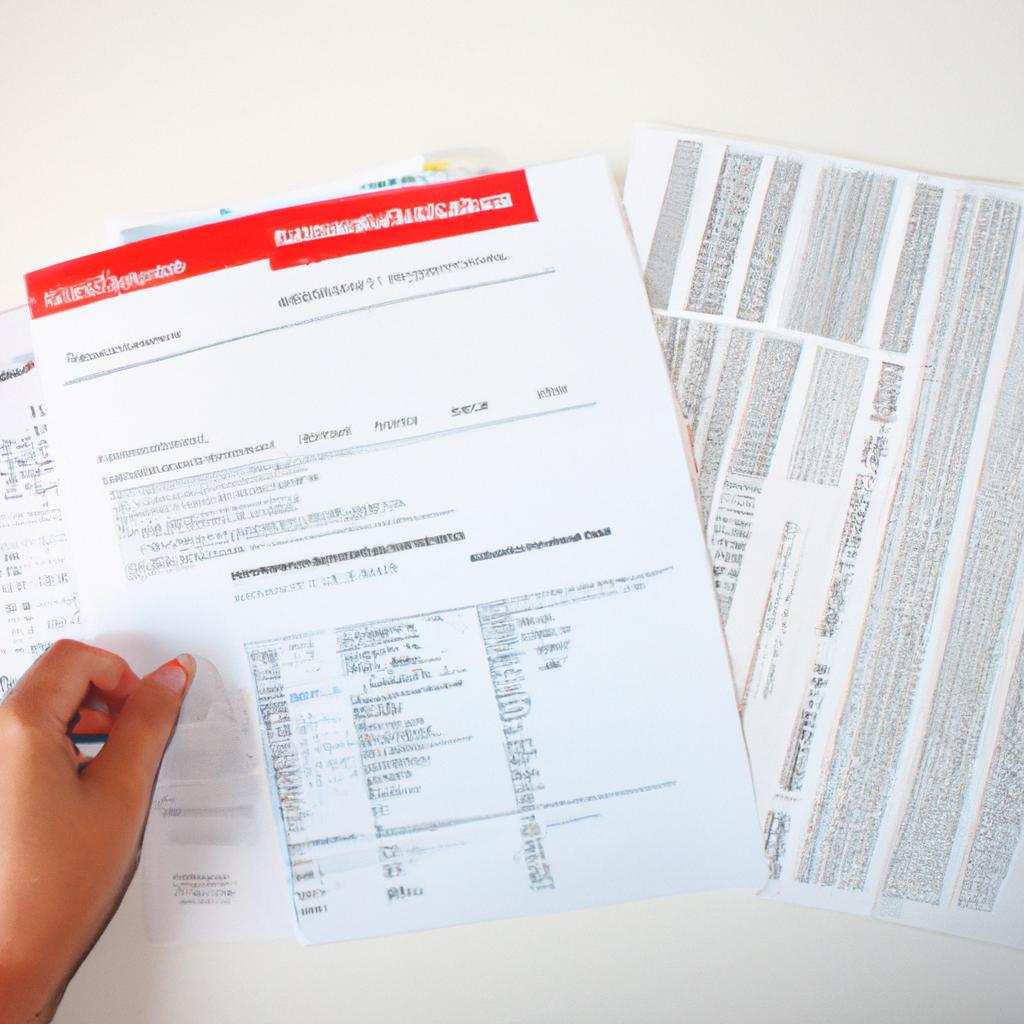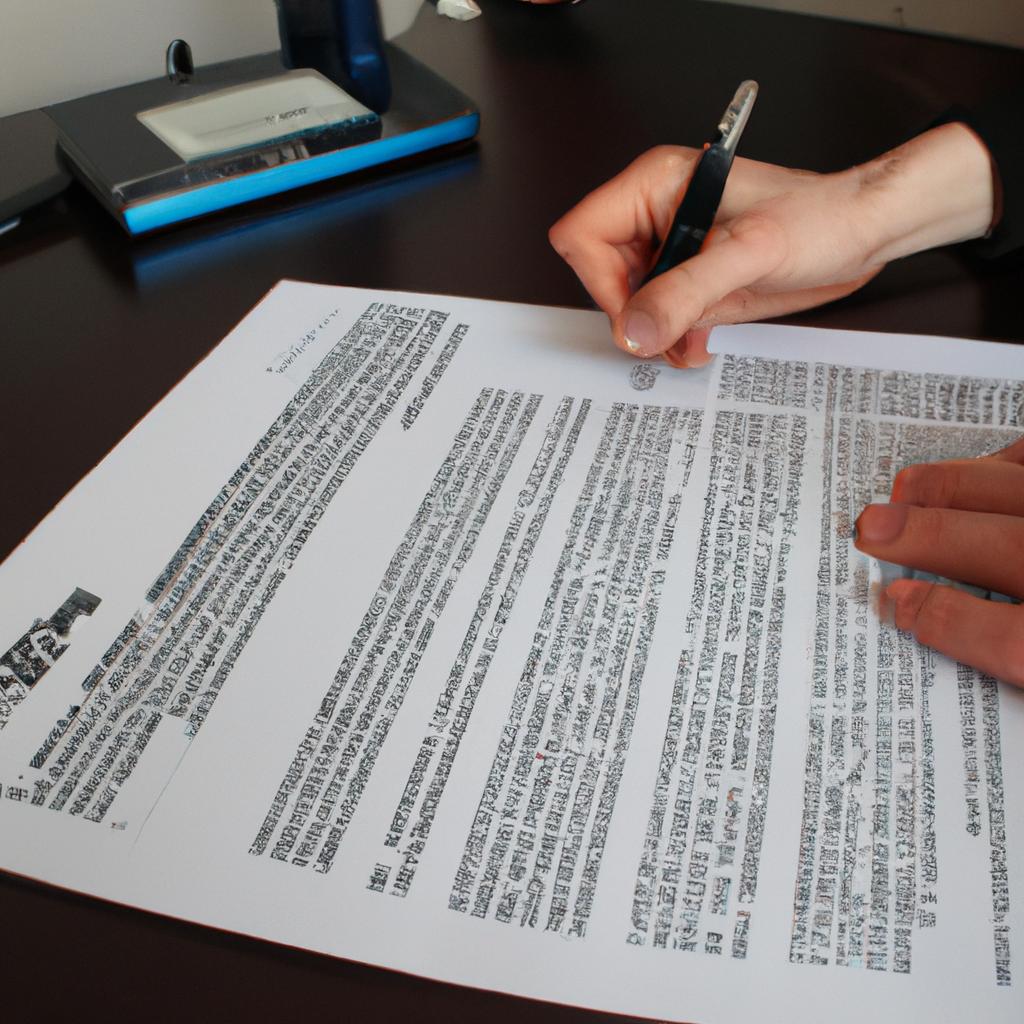Rent collection is a crucial aspect of property management in the real estate business. It involves ensuring that tenants fulfill their financial obligations by paying rent on time and in full. Effective rent collection practices contribute to the overall success and profitability of a rental property, while poor implementation can result in significant financial losses for landlords or property owners. To illustrate the importance of proper rent collection, consider the case study of an apartment complex with multiple units. In this hypothetical scenario, failure to collect rent promptly results in delayed maintenance and repair work due to insufficient funds, leading to tenant dissatisfaction and potential vacancies.
In order to successfully manage rent collection, it is essential for property managers to establish clear policies and procedures that outline expectations for tenants. This includes providing detailed information about payment methods, due dates, late fees, and consequences for non-payment. Additionally, implementing a system to track payments accurately ensures transparency and accountability between both parties involved. By adhering to these best practices, property managers can effectively handle various challenges related to rent collection such as late payments, bounced checks, or delinquent accounts. Ultimately, efficient rent collection processes not only ensure timely cash flow but also maintain positive landlord-tenant relationships and enhance overall property value.
Understanding Rent Collection
Rent collection is a fundamental aspect of property management in the real estate business. It refers to the process of collecting rental payments from tenants on a regular basis, usually monthly, as specified in the lease agreement. The efficient and effective management of rent collection plays a crucial role in ensuring the financial stability and success of any real estate investment.
To illustrate the significance of rent collection, let’s consider a hypothetical scenario. Imagine an investor who owns multiple residential properties that are leased out to tenants. Each month, these tenants are expected to pay their rent by a specific due date. Without proper rent collection practices in place, there may be instances where some tenants fail to meet their payment obligations on time or even at all. This can lead to significant cash flow challenges for the property owner, making it difficult to cover expenses such as mortgage payments, maintenance costs, and utilities.
Effective rent collection strategies help mitigate these risks and ensure consistent income generation for property owners. By implementing clear policies and procedures for rent collection, landlords can establish expectations with tenants right from the beginning of the leasing period. This includes providing tenants with convenient payment options (such as online platforms or automatic deductions), specifying penalties for late payments or non-payment, and maintaining open lines of communication regarding any potential issues or concerns related to rental payments.
Consider this bullet point list highlighting key benefits of efficient rent collection:
- Minimizes cash flow disruptions: Consistent rental income allows property owners to meet financial obligations promptly.
- Improves tenant relations: Transparent and well-executed rent collection processes foster positive relationships between landlords and tenants.
- Enhances property value: Stable cash flow resulting from timely rent collections improves overall property value.
- Simplifies accounting: Well-documented records of rental payments facilitate accurate bookkeeping and tax reporting.
In addition to these strategies, using a table format can provide further clarity when discussing different aspects of rent collection:
| Benefits | Description |
|---|---|
| Minimizes cash flow disruptions | Ensures a steady income stream for property owners. |
| Improves tenant relations | Fosters positive relationships between landlords and tenants. |
| Enhances property value | Stable cash flow contributes to the overall value of the property. |
| Simplifies accounting | Accurate record-keeping simplifies financial management tasks. |
In summary, understanding rent collection is paramount in successful property management. By implementing effective strategies and maintaining clear communication with tenants, property owners can minimize cash flow disruptions, improve tenant relations, enhance property value, and simplify accounting processes. The subsequent section will delve into the importance of consistent rent collection and its impact on long-term profitability in real estate investments.
The Importance of Consistent Rent Collection
Understanding Rent Collection is crucial in the real estate business. It ensures a steady income stream for property owners and allows for smooth operations in property management. In this section, we will delve deeper into the various aspects of rent collection and its significance.
Consider a scenario where an individual named John owns several rental properties. He relies on the monthly rent payments from his tenants to cover mortgage expenses, maintenance costs, and generate profit. However, if rent collection is not managed effectively, it can lead to financial strain and disrupt the overall functioning of the business.
To ensure successful rent collection, there are several key factors that should be taken into account:
-
Clear Communication: Establishing open lines of communication with tenants right from the start is vital. This includes setting clear expectations regarding payment due dates, preferred methods of payment, and consequences for late or non-payment.
-
Consistency: Maintaining consistency in collecting rent helps establish trust between landlords and tenants. By consistently enforcing deadlines and penalties for late payments, landlords create a sense of accountability among their renters.
-
Convenient Payment Options: Offering multiple convenient payment options increases the likelihood of timely rent collection. Online platforms, mobile apps, direct bank transfers, or even traditional methods such as checks or cash allow tenants to choose the method most suitable for them.
-
Regular Follow-up: Implementing regular follow-ups serves as a reminder to tenants about upcoming due dates. Timely reminders can significantly reduce instances of missed or delayed payments.
Table: Common Methods of Rent Collection
| Method | Description |
|---|---|
| Cash | Accepting cash payments directly from tenants |
| Checks | Collecting rent through personal or certified checks |
| Direct Deposit | Transferring funds electronically from tenant accounts to landlord accounts |
| Online Platforms | Utilizing online platforms that enable secure electronic transactions |
- Effective communication fosters a healthy landlord-tenant relationship.
- Consistency in enforcing rent collection policies encourages timely payments.
- Providing convenient payment options increases tenant satisfaction.
- Regular follow-up reminders minimize instances of late or missed payments.
In conclusion, understanding the importance of rent collection is crucial for property management. By implementing clear communication strategies, maintaining consistency, offering convenient payment methods, and following up regularly with tenants, landlords can ensure smooth operations and financial stability.
Setting Clear Rent Collection Policies
Building upon the importance of consistent rent collection, it is crucial for property managers to establish clear and effective rent collection policies. By implementing these policies, property owners can streamline their operations, minimize disputes, and ensure a steady cash flow from rental properties.
To illustrate the significance of setting clear rent collection policies, let’s consider a hypothetical scenario involving a property manager named Sarah. Sarah manages an apartment complex with multiple tenants. Without established policies in place, she often encounters challenges such as missed payments, late fees disputes, and confusion over payment methods. However, after implementing clear rent collection policies, Sarah notices a significant improvement in her management process.
To effectively set clear rent collection policies, property managers should consider the following:
-
Clearly define due dates and grace periods: By specifying the exact date when rents are due and any applicable grace period, tenants will have a better understanding of their obligations. This clarity reduces excuses for late payments or misunderstandings about deadlines.
-
Provide various payment options: Offering multiple convenient payment methods increases the likelihood of timely payments. Tenants may prefer online platforms like electronic funds transfer (EFT), credit card payments, or even traditional methods such as checks or money orders.
-
Outline consequences for non-payment: It is essential to clearly communicate the repercussions of not paying rent on time. This includes outlining late fee charges, potential eviction processes if necessary, and any legal actions that might be taken as a last resort.
-
Establish open communication channels: Encourage tenants to reach out regarding any financial difficulties they may face by providing accessible contact information for inquiries related to rent collections. Maintaining open lines of communication fosters trust and enables prompt resolution of issues before they escalate.
Creating well-defined rent collection policies helps property managers maintain efficiency while ensuring fair treatment towards both tenants and property owners alike.
| Advantages | Disadvantages | |
|---|---|---|
| EFT | – Convenient and fast | – Requires online banking |
| Credit card payments | – Allows flexibility for tenants | – May incur transaction fees |
| Checks | – Familiar payment method | – Potential delays in processing |
| Money orders | – Guaranteed funds | – Inconvenient for some tenants |
With clear rent collection policies in place, the next step is to choose the right rent collection method that aligns with these established protocols.
Choosing the Right Rent Collection Method
Transitioning from setting clear rent collection policies, it is crucial for property managers to choose the right method of collecting rent. This decision can greatly impact both tenant satisfaction and overall efficiency in managing rental properties. To illustrate this point, let’s consider a hypothetical scenario:
Imagine a property manager named Sarah who manages multiple residential units. In the past, she relied on traditional methods such as collecting monthly checks or cash payments from tenants. However, this approach often led to delays and inefficiencies due to lost or misplaced payments. As a result, Sarah decided to explore alternative rent collection methods that could streamline the process.
When choosing the right rent collection method, there are several factors to consider. Here are four key points to guide your decision-making:
- Convenience: The chosen method should be convenient for both tenants and property managers alike. It should enable tenants to easily make their payments without unnecessary hurdles or inconvenience.
- Security: Ensuring secure transactions is paramount when handling financial matters. Look for methods that offer secure payment channels and protect sensitive information.
- Timeliness: Prompt rent collection is essential for maintaining consistent cash flow and avoiding potential issues with late payments. Opt for a method that facilitates timely collections.
- Record-keeping: Effective record-keeping is vital for accurate accounting and tracking of rental income over time. Consider methods that provide digital records or integrated software solutions.
To further understand these considerations at a glance, refer to the table below outlining various rent collection methods along with their associated advantages and disadvantages:
| Method | Advantages | Disadvantages |
|---|---|---|
| Online Payment Systems | – Convenient and accessible | – Potential transaction fees |
| – Automated reminders | – Dependency on internet connectivity | |
| Direct Debit | – Automatic deductions | – Requires tenant authorization |
| – Ensures timely payments | – Potential disputes over deductions | |
| Mobile Payment Apps | – Easy and quick transactions | – Reliance on tenants having compatible devices |
| – Digital record-keeping | – Potential security risks |
By carefully considering these factors and weighing the advantages and disadvantages, property managers can make an informed decision about the most suitable rent collection method for their specific needs.
Transitioning into the subsequent section about effective communication in rent collection, it is essential to establish clear channels of interaction between property managers and tenants.
Effective Communication in Rent Collection
Having discussed the importance of choosing the right rent collection method, it is equally crucial to emphasize effective communication in the process. By establishing clear and open lines of communication with tenants, property managers can foster positive relationships while ensuring timely and consistent rent payments. Let us explore some key strategies for effective communication in rent collection.
One example that highlights the significance of effective communication is a scenario where a tenant is facing financial difficulties due to unexpected circumstances such as job loss or medical expenses. In such cases, having empathetic and proactive communication channels allows property managers to understand their tenants’ situations and work together towards finding suitable solutions. This approach not only helps maintain tenant satisfaction but also minimizes potential conflicts related to late or non-payment of rent.
To facilitate effective communication, consider implementing the following practices:
- Regularly scheduled check-ins with tenants through phone calls or emails.
- Providing multiple channels for tenants to reach out, including phone, email, and an online portal.
- Ensuring prompt responses to tenant inquiries or concerns within a reasonable timeframe.
- Utilizing technology tools such as automated reminders for upcoming rental payments.
These practices will help establish transparency, trust, and accountability between property managers and tenants. To further illustrate this point, let’s take a look at a table showcasing the outcomes associated with different approaches to communication during rent collection:
| Communication Approach | Outcome |
|---|---|
| Clear and responsive | Positive landlord-tenant relationship; increased likelihood of on-time payment |
| Minimal or delayed | Strained relationship; higher chances of late or non-payment |
| Empathetic and proactive | Increased understanding; collaborative problem-solving |
| Unresponsive | Frustration; lack of cooperation |
By prioritizing effective communication throughout the rent collection process, property managers create an environment conducive to successful outcomes for both parties involved. It sets the stage for addressing any potential challenges promptly and constructively. This positive approach also establishes a solid foundation as we move forward into discussing how to handle late or non-payment of rent.
Understanding the importance of effective communication in rent collection, it is equally crucial to address situations when tenants face difficulties with paying their rent on time. The following section will delve into strategies for handling late or non-payment of rent without compromising tenant relationships.
Handling Late or Non-Payment of Rent
In the previous section, we discussed effective communication in rent collection. Now, let’s delve into another crucial aspect of property management: handling late or non-payment of rent. To illustrate this further, let’s consider a hypothetical scenario.
Imagine you are managing an apartment complex with multiple tenants. One tenant, John, has consistently paid his rent on time for the past year. However, due to unforeseen circumstances, he is unable to make payment by the agreed-upon date. As a property manager, it is essential to address such situations promptly and effectively.
When faced with late or non-payment of rent, here are some key steps you can take:
- Communication: Initiate immediate contact with the tenant to understand their situation and discuss possible solutions. Be empathetic and understanding while maintaining professionalism.
- Establish agreements: Work together with the tenant to develop a plan that outlines clear expectations regarding when and how they will catch up on missed payments.
- Document everything: Keep detailed records of all interactions related to late or non-payment of rent. This documentation serves as evidence if legal action becomes necessary.
- Legal considerations: Familiarize yourself with local laws and regulations governing eviction processes in case it becomes unavoidable.
To provide a visual aid highlighting common reasons for late or non-payment of rent, refer to the following table:
| Reason | Explanation | Emotional Response |
|---|---|---|
| Job loss | Inability to meet financial obligations | Anxiety |
| Medical emergency | Unexpected expenses impacting income | Concern |
| Family crisis | Diversion of funds towards urgent matters | Worry |
| Irresponsible behavior | Lack of prioritization leading to financial strain | Frustration |
Remember that each tenant’s situation may be unique; therefore, flexibility combined with firmness is vital when addressing late or non-payment of rent. By maintaining open lines of communication and providing support where appropriate, you can work towards resolving these issues while preserving a good landlord-tenant relationship.
In summary, handling late or non-payment of rent requires proactive communication, establishing agreements, proper documentation, and understanding legal considerations. Being well-prepared to address such situations ensures that the property management process remains efficient and minimizes potential conflicts.




